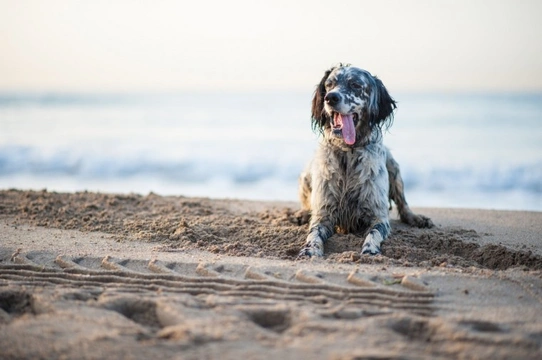
Is it dangerous if a dog swallows or eats sand?
Eating sand or accidentally swallowing sand can be very dangerous for a dog if this happens in sufficient quantities; and it might not actually take very much sand in total to pose a threat. In fact, if you’re spending a day at the beach with your dog and they’re just chilling out and doing any or all of the normal things dogs might do on a beach (like lying on the sand, having a paddle or a swim, playing with a toy or retrieving something, or nosing about exploring smells and so on) they might well swallow some sand.
How much sand is dangerous for a dog in terms of ingestion will depend a lot on the size of the dog, and to an extent, the type of sand – and in some ways, luck, good or bad.
This article will tell you more about the issue swallowing sand can cause for dogs, how this might happen, and what you can do to reduce the risks.
How would a dog come to swallow sand in the first place?
You might well be wondering what sort of scenario might cause a dog to swallow sand in the first place; after all, even for dogs that will eat absolutely anything, sand is hardly likely to be something a dog eats, is it!
Well generally not deliberately, although do bear in mind that dogs with a condition called pica (eating things that are undeniably inedible even to the average dog) might indeed eat sand deliberately too.
However, with that caveat out of the way, there are quite a few things that can result in a dog ingesting or swallowing sand accidentally; and over the course of the day at the beach, if you factor in a few of these, a dog could potentially swallow enough sand to pose a threat to their health.
This is most likely to happen on the beach, but can also happen in a sand pit, play area, or anywhere sand is on the ground (like perhaps a riding area or building site) as this can result in sand ingestion too.
The most common ways this might happen then would be if a dog lay down in sand (particularly wet sand that clings to the coat) or got it on their legs and belly on the beach, and then licked it from their coat and swallowed it inadvertently when grooming themselves.
If your dog eats something on the sand (like if you put a treat down for them or they scavenged something you dropped) they’re going to get a bit of sand along with this too. Playing with toys on the beach or on sand, particularly when the toy gets seawater or just slobber on it and sand clings to it will result in them swallowing sand as well.
Also, if your dog is nosing about and finds something interesting, or tries to buy or dig something up on the beach or in sand, they’re potentially going to ingest more.
All of these things are only each individually likely to result in the ingestion of a small amount of sand each time, none of which on its own should be enough to pose a threat to most dogs. But cumulatively, or if the dog, say, keeps eating things off the sand of picking up/chewing sandy toys, it could be an issue.
What can happen if a dog swallows sand?
There are two potential problems that can arise if a dog swallowed a sufficient quantity of sand to pose a risk to them. The first is that they will swallow something or more than one something that is sharp (like parts of seashells) and that this can cause internal damage.
However, the more likely and common problem that can arise if a dog eats sand is that the sand itself, which is heavy (particularly when soaking wet as it would be in the dog’s digestive system) will literally silt up a part of their digestive system, causing an internal blockage. This can then also form a hard, compact mass; stopping up the dog’s whole digestive system and posing an acute threat to their health.
This won’t happen immediately, and is something that would occur hours or even potentially a day or more later, so do bear this in mind.
This will not happen to all or even potentially, most dogs that ingest sand, but the risk is there, and is higher the more they ingest.
Preventing your dog from ingesting sand
Taking your dog to the beach is absolutely fine, but you should try to keep your dog from ingesting sand as far as possible. This means things like brushing or rinsing it from their coat regularly, washing or brushing off sandy toys, and stopping your dog from digging or burrowing in sand.
You should also not feed them, or let them pick up scraps, from the sand.
Keeping your dog properly hydrated is important too, as this will help to ensure that any small quantities of sand your dog might ingest has a better chance of passing out through their digestive system in the normal manner, rather than building up to potentially cause a problem.



